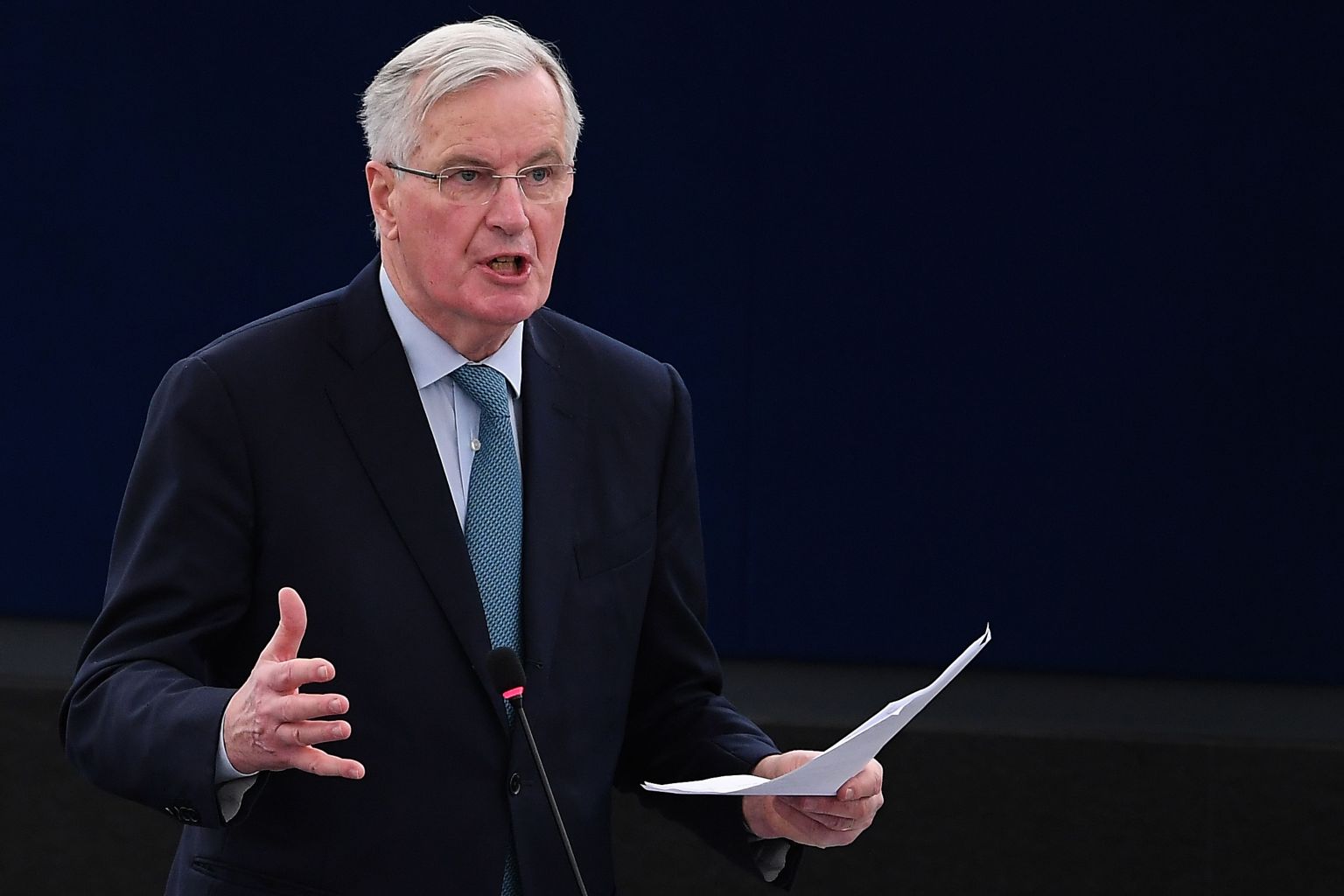EU open to closer ties with Britain but no renegotiation of withdrawal deal
Sign up now: Get ST's newsletters delivered to your inbox

EU chief negotiator Michel Barnier indicated that one way forward would be for Britain to accept closer alignment with EU regulations to secure a very close trading relationship.
PHOTO: AFP
Follow topic:
STRASBOURG/BRUSSELS (REUTERS) - The European Union would consider a potential British request for closer post-Brexit ties than London has sought so far, but will not renegotiate the withdrawal agreement rejected by Parliament, its Brexit negotiator said on Wednesday (Jan 16).
Addressing the European Parliament on Wednesday, EU chief negotiator Michel Barnier indicated that one way forward would be for Britain to accept closer alignment with EU regulations to secure a very close trading relationship. EU officials say London could, for example, abandon its determination to leave the EU customs union and centrally regulated single market.
"If the United Kingdom chooses to let its red lines change in future, and that it takes this choice for its advantage of the ambition of going beyond a simple but not negligible free trade accord, then the European Union would be ready immediately to... respond favourably," Mr Barnier said.
EU leaders lined up to again rule out any significant change to the binding withdrawal agreement they struck with Mrs May last month and that was crushed the previous evening by British lawmakers on opposing sides of the bitter Brexit divide.
However, the sides have also negotiated a separate, non-binding political declaration which spells out their future aims. Asked if Mr Barnier was suggesting reworking that outline of future ties, the EU executive's chief spokesman told reporters: "The withdrawal agreement - and, I repeat, the withdrawal agreement -... is not open for renegotiation."
EU officials say staying permanently in the EU customs union or even the full single market would greatly limit disruption on Northern Ireland's EU land border and so ease arguments over the EU's insistence on an "Irish backstop" protocol in the withdrawal agreement that many British lawmakers abhor.
With just 10 weeks to go until Britain's two-year deadline for a deal or no-deal exit, Union politicians were less sanguine than investors.
Markets reflected views that a stalemate may keep Britain in the EU beyond March 29, or even forever. But Mr Barnier and others warned that the risk of a disorderly departure into a chaotic legal limbo was now greater than ever and that it was a priority for other European countries to prepare for the worst.
Mr Barnier's suggestion for a "deeper relationship" was echoed by the EU legislature's Brexit coordinator, Mr Guy Verhofstadt, and a German lawmaker briefed in Berlin by Chancellor Angela Merkel said she was open to further talks on the future relationship.
But Mr Barnier and others also highlighted how the vote in London exposed only divisions, without shedding light on what Britons could actually rally behind as a consensual position, just 10 weeks before the country is set to leave the bloc.
"Please, please, please tell us finally what you want to achieve," pleaded Mr Manfred Weber, the centre-right leader in the EU parliament and an ally of Europe's key power broker, Dr Merkel.
Mr Barnier was also wary. "Right now it's too early to assess all the consequences of this vote," he told a Strasbourg chamber sparsely attended by EU lawmakers growing weary of British woes.
"What yesterday's vote showed is that the political conditions for the ratification of the withdrawal agreement are not yet there in London."
Some leaders voiced an openness to extending the March 29 deadline, though any longer than three months would complicate plans for elections to the European Parliament in May.
Britain would need to ask for any extension and also show exactly what it aimed to achieve with the reprieve, rather than just delay for its own sake, if it wanted other countries'approval, the commission said.
Some EU lawmakers have called for Britain to put the question of remaining in the EU to a second referendum. The chair of EU summits, Mr Donald Tusk, suggested on Tuesday that division in Britain could lead to Brexit being cancelled.
Mr Frans Timmermans, the deputy head of the European Commission, citing a phrase often attributed to British fantasy novelist C.S. Lewis, suggested Britain should put its past tribulations behind it and seek a fresh start with the EU. "You can't go back and change the beginning," the former Dutch foreign minister said, "but you can start where you are and change the ending."
Mr Nigel Farage, the former leader of the UK Independence Party which drove the campaign for the 2016 vote to leave, told fellow members of the European Parliament that any second ballot would deliver an even greater majority for quitting because Britons had been angered by the EU's stance in negotiations.

